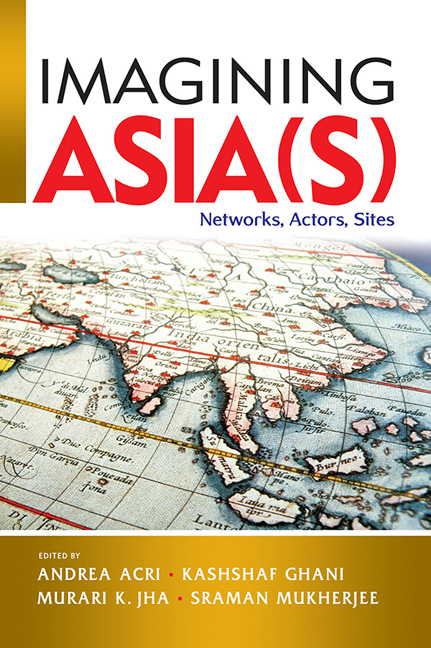Book contents
- Frontmatter
- Contents
- List of Contributors
- Introduction
- Part I Conceptualizing the Region: Past and Present
- Part II Conceptualizing Asia through the Prism of Europe
- 4 In Pursuit of Knowledge from Asia: François Valentijn on the Hindu Social Divisions in the Coromandel Region, c. Seventeenth–Eighteenth Century
- 5 British Romantic Poetics and the Idea of Asia
- Part III Networks of Knowledge Across the Indian Ocean
- Part IV Histories and Geographies of Pilgrimage in Asia
- Part V Trans-Local Dynamics and Intra-Asian Connections across Space and Time
- Index
4 - In Pursuit of Knowledge from Asia: François Valentijn on the Hindu Social Divisions in the Coromandel Region, c. Seventeenth–Eighteenth Century
from Part II - Conceptualizing Asia through the Prism of Europe
Published online by Cambridge University Press: 31 January 2020
- Frontmatter
- Contents
- List of Contributors
- Introduction
- Part I Conceptualizing the Region: Past and Present
- Part II Conceptualizing Asia through the Prism of Europe
- 4 In Pursuit of Knowledge from Asia: François Valentijn on the Hindu Social Divisions in the Coromandel Region, c. Seventeenth–Eighteenth Century
- 5 British Romantic Poetics and the Idea of Asia
- Part III Networks of Knowledge Across the Indian Ocean
- Part IV Histories and Geographies of Pilgrimage in Asia
- Part V Trans-Local Dynamics and Intra-Asian Connections across Space and Time
- Index
Summary
Asia is inhabited as far as India; but beyond this, it is all desert towards the east, nor is any one able to describe what it is. Such and so great is Asia (Cary 1848, p. 250).
INTRODUCTION
By examining some key texts written by the Dutch clergymen Abrahmus Rogerius, Philippus Baldaeus and François Valentijn, I discuss how knowledge about precolonial southeastern India was produced, disseminated, and consumed. Although by their very nature these Dutch accounts are culturally mediated and coloured by religious presuppositions and agendas, an analysis of some of these texts may help the historian to evoke some prevalent Western ideas about the society in the Coromandel region in the early modern period (sixteenth to eighteenth century).
The need to create and improve upon the rudimentary knowledge about the East that was inaugurated by Herodotus in his Histories would continue in the Hellenistic and Roman worlds through the Renaissance and early modern Europe. For example, in the so-called Age of Explorations the European curiosity to learn about Asia metamorphosed into the systematic creation of tangible knowledge. In fact, the survival of the nascent states in the fiercely competitive, and religion-inspired and ideologically fragmented society of Western Europe depended on the creation and documentation of new knowledge (van Linschoten 1885). For example, charting the sea routes, mapping regions, river estuaries or strategic ports, documenting commodities, and describing local populations and their belief systems, all constituted practical and usable forms of knowledge. In post-Enlightenment eighteenth-century Europe, knowledge about Asia was deployed not only for the strategic and commercial purposes but also to understand and define the European Self in contrast to the Asian Other. The creation, documentation, and dissemination of knowledge through the printing and publishing revolution also bequeathed important information about the functioning of social categories and “superstitious” beliefs on the different regions of the continent.
In this chapter I shall focus on Valentijn's writings about the social and religious aspects of Hindu society in southeastern India during his time. Before the Dutch came to the region, the Portuguese missionaries had tried to advance the cause of Christianity in the region.
- Type
- Chapter
- Information
- Imagining Asia(s)Networks, Actors, Sites, pp. 93 - 124Publisher: ISEAS–Yusof Ishak InstitutePrint publication year: 2019



